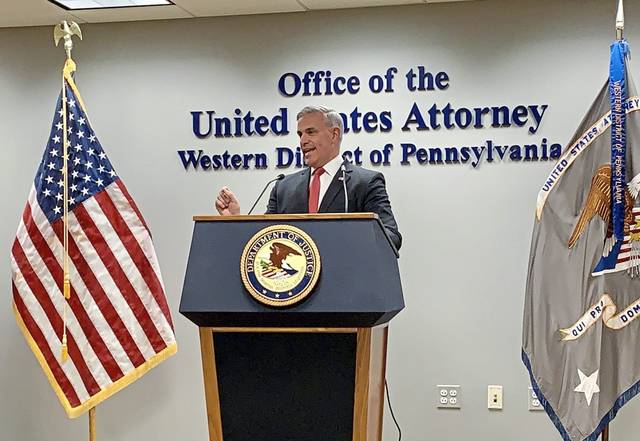For seven years, employees and supervisors at the Pittsburgh Water and Sewer Authority dumped sludge into the Allegheny River from the Aspinwall treatment facility, violating the Clean Water Act and sending plumes of rust-colored chemicals into the river, U.S. Attorney Scott Brady said Wednesday.
The authority pleaded guilty to eight federal charges, including seven counts of lying on written reports to the Environmental Protection Agency, Brady said. The pollution and false reports occurred between 2010 and 2017.
In a related indictment, former Aspinwall Drinking Water Treatment Plant supervisor Glenn Lijewski was charged with conspiracy to violate the Clean Water Act and two counts of violating PWSA’s pollutant discharge permit.
“PWSA was not permitted to discharge clarifier sludge into the Allegheny River, but that’s exactly what they did for seven years,” Brady said.
In a statement, PWSA said the authority has “fully cooperated” with the Department of Justice and the EPA, and the actions that spurred the criminal charges did not jeopardize the safety of the water.
“Both compliance issues raised in the investigation have been rectified and had no impact on the quality or safety of the drinking water,” the statement read. “The authority has altered the treatment plant to make these discharges to the river physically impossible.”
In a plea agreement, PWSA agreed to pay $500,000 into a self-funded compliance program, which will be monitored by the U.S. Attorney’s Office, Brady said. The authority will spend three years on probation, during which time annual reports and audits must be submitted to the Department of Justice and the Environmental Protection Agency.
Brady said the plea agreement bars PWSA from raising rates to pay for the fine.
“We are not allowing PWSA to pass on the cost of their failures to the city of Pittsburgh,” he said.
The sludge pumped into the river is generated during the drinking water treatment process. Chemicals to treat the water are added to it, which causes small debris chemicals in the water to clump together. That semi-treated water goes into basins where the solids and debris settle, after which the water goes back to the Aspinwall plant for the clarification process. That process includes adding more chemicals to the water that cause any remaining solids to clump and settle to the bottom of the clarifier basins.
The solids left in the bottom, called sludge, are supposed to be pumped to the ALCOSAN waste treatment facility. Instead, employees and supervisors at the Aspinwall plant would pump that sludge directly into the river, sometimes by physically turning a valve to release the sludge, according to court documents.
Brady said equipment used to measure the amount of sludge generated daily were broken for years, and employees lied on reports to the EPA to cover up the inoperable equipment. He said Lijewski, the former supervisor, was directly involved in dumping the sludge into the river and directed other employees to do the same.
Pumping the sludge into the river created plumes of discolored water that could stretch as long as several hundred feet, Brady said, and the sludge would sometimes build up to the point that it created islands that were visible when the water level was low.
“In fact,” he said, “birds were observed walking on these islands of sludge.”
William Pickering, PWSA’s chief executive, called the violations “an unfortunate product of decades of disinvestment” in the water system and its employees.
“Under new leadership, PWSA has the financial resources to appropriately invest in the water treatment plant and is working with the EPA to ensure that the Authority and its employees comply with all environmental laws,” he said.








